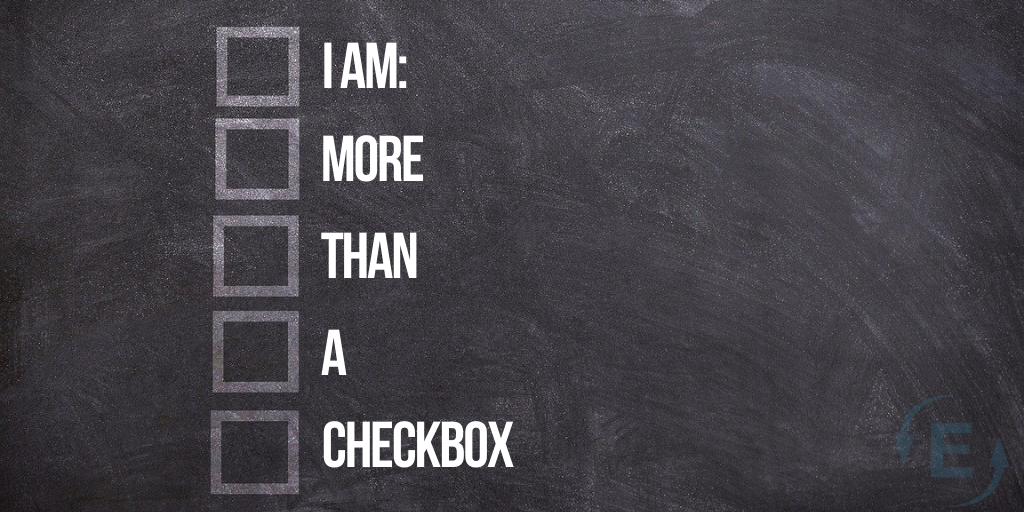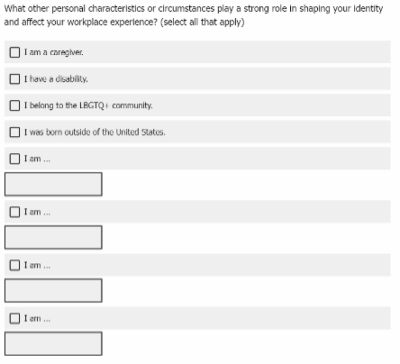
Race, ethnicity, sex, gender identity, sexual orientation, disability, nationality, religion, class, language, mental health – these characteristics and others make for complex intersectional identities that do not neatly align with typical demographic questions found on surveys.
Yet, for program designers and evaluators to understand the audiences being served, some collection of demographic data is necessary.
We are the internal evaluation team for the ADVANCE Midwest Partnership (AMP) – Joining Forces project, funded by the National Science Foundation’s ADVANCE program.
Like all NSF ADVANCE projects, AMP seeks to improve gender, racial, and ethnic equity among STEM faculty. AMP has a special focus on advancing equity among women with caregiving responsibilities, women of color, and others who face bias based on their intersectional identities.
Kimberlé Crenshaw (1989) coined the term intersectionality as a way to frame the experience of being both Black and female. She recently defined it as “a lens, a prism, for seeing the way in which various forms of inequality often operate together and exacerbate each other” (quoted in Steinmetz, 2020).
In evaluating the Joining Forces project, we developed survey items to capture standard demographic data about program participants while also allowing survey respondents to share other personal characteristics or circumstances that play a strong role in shaping their identity.
We asked about race/ethnicity and gender in fairly standard formats, as shown in Figures 1 and 2.
Figure 1. Race/Ethnic Identity Question Figure 2. Gender Identity Question¹


To allow respondents to share other pertinent information about themselves, we also included a less conventional question.
As shown in Figure 3, this select-all-that-apply question includes preloaded items of interest to the Joining Forces project, along with four open-ended items that invite people to describe themselves in their own words.
Figure 3. “I am….” Question²

Most respondents used at least one of the open-ended items to disclose information they felt was important to their identity and affected their experience in their academic workplace. Several respondents described themselves as being a parent, the first in their family to go to college, an immigrant or migrant, older than their colleagues, atheist or nonreligious, or as having mental or physical challenges. Others disclosed being in recovery or being an introvert, neurodivergent, or dyslexic. The word cloud below illustrates the array of traits that respondents felt influenced their identities and workplace experiences:

This survey item doesn’t solve the tension between needing to honor the intersectional and unique identities of program participants and needing to capture basic demographic information. But it does do two valuable things:
- It generates program participant data that provide useful insights that close-ended items could never capture.
- It communicates to survey respondents that the program designers and evaluators understand their lives and identities are complex, not reduceable to a few checkboxes on a survey.
Notes:
(1) Following a review of this blog post and our survey questions by Carolyn Camman, an evaluator with inclusion expertise, we added I identify as non-binary as a response option for the gender identity question. Carolyn recommended adding this option, pointing out there was not a strong reason for including the gender-fluid option while omitting other more common gender identities. They recommended the report, Being Seen, Being Counted: Establishing Expanded Gender and Naming Declarations to learn more about the nuances of asking about and collecting data about gender identities.
(2) Originally, the response option about disability was “I am differently abled.” Carolyn pointed out that this language is “not generally accepted by disabled people as a self-descriptor” and recommended the article “Whatever You Do Don’t Call Me Differently Abled” for more information.
This material is based upon work supported by the National Science Foundation under Grant Numbers 1935960, 1935942, 1935932, and 1935944 (ADVANCE Midwest Partnership). Any opinions, findings, and conclusions or recommendations expressed in this material are those of the authors and do not necessarily reflect the views of the National Science Foundation.

Except where noted, all content on this website is licensed under a Creative Commons Attribution-NonCommercial-ShareAlike 4.0 International License.









 EvaluATE is supported by the National Science Foundation under grant number 2332143. Any opinions, findings, and conclusions or recommendations expressed on this site are those of the authors and do not necessarily reflect the views of the National Science Foundation.
EvaluATE is supported by the National Science Foundation under grant number 2332143. Any opinions, findings, and conclusions or recommendations expressed on this site are those of the authors and do not necessarily reflect the views of the National Science Foundation.